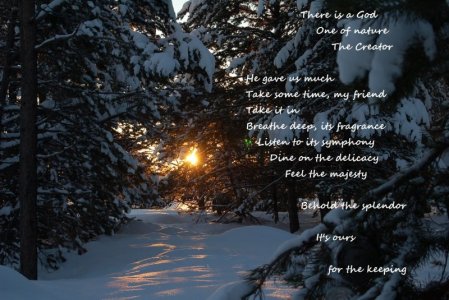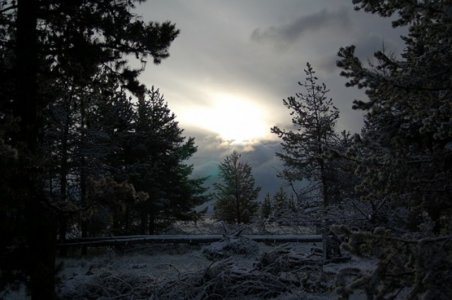You are using an out of date browser. It may not display this or other websites correctly.
You should upgrade or use an alternative browser.
You should upgrade or use an alternative browser.
What do people mean when they say they are spiritual, but not religious. I understand the not religious part.
- Thread starter WheatenLover
- Start date
senior chef
Senior Member
I am awed by nature. When I walk quietly through the old growth redwood forests, I feel something special. I don't concern myself with how those trees came into being.
I can't say that I believe in a supreme being, but if one does exist, he is an absentee landlord.
In any event, people can, and do, interpret so-called holy writings as they choose.
Even as a child, I understood that, "Spare the rod. Spoil the child", was evil .
I can't say that I believe in a supreme being, but if one does exist, he is an absentee landlord.
In any event, people can, and do, interpret so-called holy writings as they choose.
Even as a child, I understood that, "Spare the rod. Spoil the child", was evil .
Shero
Senior Member
- Location
- Transient in the Land of Oz
Oui Santa, I am with you on this. Spritual is the awe of nature, the awe that there is a Creator, a feeling deep inside that very few can explain, some try but go off at a tangent.For me, there's no need to clutter things up with words....although I did clutter up a pic of mine anyway;
religious
View attachment 183584
spiritual
View attachment 183585
View attachment 183592
Dancing_Queen
Member
Your final paragraph is, of course, the way science works. Paradigms change. And this is what's so hard for many people who are unversed in the ways of science find so hard to fathom. It's also one of the things that's fueling the current anger about the way the CDC has handled things. As they learn, they change the paradigm and this is normal.Personally, i don't classify anything as supernatural or paranormal they are naturally occurring things that we just don't have explanations for yet. i will sometimes use those words for convenience sake but often preceded by "so-called".
Once one accepts the notion that consciousness is not just a by product of physical brain and social conditioning, that neither matter or energy can be destroyed but they covert back and forth and that all living things have energy fields all sorts of things labeled as being outside the range of natural/normal make sense. Telepathy, psychometry, premonitions, remote veiwing (deliberately or in dreams).
For long time neurobiology has focused on understanding the our 'minds' considering only the physical aspects of the brain and essentially ignoring the mind or consciousness. Neuroplasticity goes a long way in explaining many of the 'phenomena', the results i've both experienced with meditation and witnessed among other meditators, but i think some of that is confusing cause and effect. In time, at current rate likely after i've transitioned, they may recognise and acknowledge that consciousness was the driving force of how our brains evolved and how they function, and that personal intention, goals influence the nuts/bolts of neurons and synapses that allows for what they are currently learning about neuroplasticity.
I am a big fan of science, but very aware of how rigid paradigms can be. In desperation to be considered a science the field of human psychology went to far in viewing the mind in mechanistic terms, with the notion that chemistry could solve all mental problems. In practice they created more problems because not only are things like dosage for individual needs important they were accurate diagnosis is crucial and Szasz did studies that showed that diagnosis often varies depending on each doctor's interests and areas of expertise, despite being presented the same symptoms and behaviors as each other.
As for consciousness, just about anything you can say about it will have adherents and detractors since we really don't have much of an understanding of what it is, let alone how it is that we have it. We don't even have a single definition of it! I think if the people working in the field can come up with a consensus definition, they'd be able to get on with the understanding of it much more quickly than is currently the case.
And that's what makes it spiritualSpritual is the awe of nature, the awe that there is a Creator, a feeling deep inside that very few can explain
The mystery
The intangibility
But
The fathomless depth within
Shero
Senior Member
- Location
- Transient in the Land of Oz
And that's what makes it spiritual
The mystery
The intangibility
But
The fathomless depth within
I am the dust in the sunlight,
I am the ball of the sun . . .
I am the mist of morning,
the breath of evening . . . .
I am the spark in the stone,
the gleam of gold in the metal . . . .
The rose and the nightingale
drunk with its fragrance.
I am the chain of being,
the circle of the spheres,
The scale of creation,
the rise and the fall.
I am what is and is not . . .
I am the soul in all.
Rumi
Well said, Della.My brother once told me he was "spiritual but not religious." I knew he had been against religion since he was a teenager because he thought our pastor had done a mean thing in telling one of our members he could not come to our church anymore. ( Turns out my brother hadn't understood the perfectly good reason for that.) But my brother was a sensitive person, deeply and easily moved by music, natural beauty and art, and he loved people and was always kind. So I think that's probably why he defined himself as "spiritual."
Conversely, I don't think I've ever heard anyone say they were religious but not spiritual. I consider myself religious because I try to follow the values Jesus taught. I enjoyed going to church when it was physically easier for me, but I never went to church to have the minister tell me what to do or to interpret the Bible for me. I read the Bible for myself. I like hearing a good minister with a good sermon. The best ones are usually based on their own mistakes and what they have learned from them. The judgmental, bully pastors telling teenagers that rock and roll is evil have only existed in movies for me.
Jesus never said we should kill people who don't agree with his teachings, just the opposite in fact.
I think most wars were started by power greedy rulers who used religion to motivate their armies and the religion got blamed.
I've belonged to a lot of Christian churches and I never heard anyone suggest we should kill people who don't agree with us.




